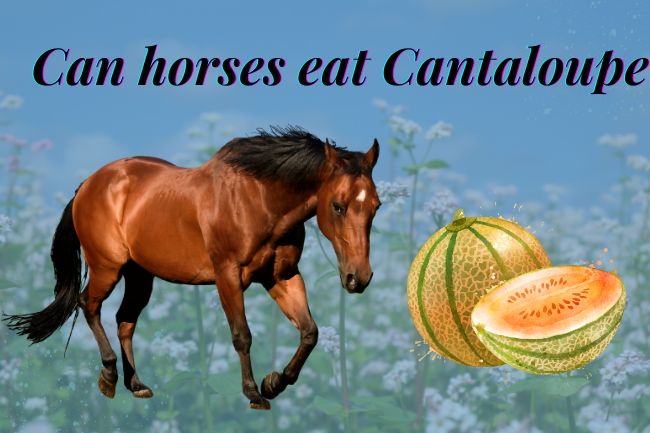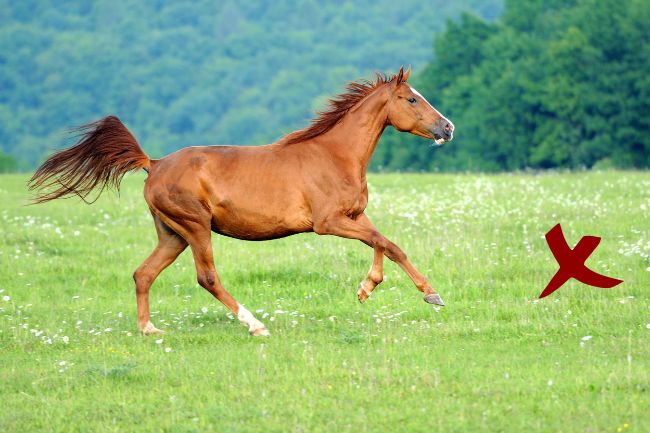Can horses eat cantaloupe? This question often arises among horse owners seeking to diversify their equine companion’s diet. Cantaloupe, a juicy and refreshing fruit, can indeed be fed to horses. Packed with water content and essential vitamins, cantaloupe can serve as a healthy addition to a horse’s diet. However, it is important to remove the rind and seeds before offering it to horses. Monitoring their reaction is crucial, as some horses may have sensitivities or allergies. As with any new food, it’s recommended to introduce cantaloupe gradually and observe any adverse effects. Consulting with a veterinarian or equine nutritionist is always advisable to ensure a well-balanced and suitable diet for horses.
Let’s delve deeper into the topic and discover the benefits and considerations of feeding cantaloupe to horses.

1. Can horses eat cantaloupe
Yes, horses can eat cantaloupe. Cantaloupe is a refreshing and hydrating fruit that can be offered to horses as a treat or added to their regular diet. It is important to remove the rind and seeds before feeding, as they can be difficult to digest. Cantaloupe is a good source of vitamins A and C, as well as dietary fiber. However, like with any new food, it is recommended to introduce cantaloupe gradually and in moderation to monitor your horse’s response. Consult with a veterinarian or equine nutritionist for specific feeding guidelines based on your horse’s individual needs.
2. Why is cantaloupe good for horses?
Cantaloupe can benefit horses in several ways. Here are some key benefits:
- Hydration: Cantaloupe is a hydrating fruit that can help keep horses properly hydrated and prevent dehydration.
- Vitamins and minerals: Cantaloupe is rich in vitamins A and C, providing antioxidants and supporting the horse’s immune system. It also contains minerals such as potassium, magnesium, and zinc.
- Digestive support: Cantaloupe contains dietary fiber, which can aid in digestion and support proper gut function in horses.
- Cooling effect: On hot days, cantaloupe can help cool down the horse’s body temperature and provide relief from heat.
However, it’s important to feed cantaloupe in moderation and as part of a balanced diet. Remove the rind and seeds before feeding, and ensure that cantaloupe is included as a complement to the horse’s overall nutrition and dietary needs.

3. Risks and Limitations When Feeding Cantaloupe to Horses
When feeding cantaloupe to horses, it is important to consider the following risks and limitations:
- Choking hazard: Cantaloupe has a tough and indigestible rind that can pose a choking risk to horses. Therefore, it is crucial to completely remove the rind before feeding it to horses.
- Digestive issues: Cantaloupe seeds can also cause digestive problems for horses. If horses consume too many seeds, it can lead to blockages or other digestive issues. Hence, it is essential to remove all the seeds before feeding cantaloupe to horses.
- Monitor reactions: Carefully observe the horse’s response after feeding them cantaloupe. If the horse exhibits any negative reactions such as mouth ulcers, diarrhea, or difficulty digesting, it is necessary to discontinue feeding cantaloupe and consult a veterinarian.
- Limit the quantity: Cantaloupe should be fed to horses in limited amounts. It should only serve as a supplementary food and should not replace the horse’s main diet, which includes dry hay, fresh grass, and appropriate feed.
- Dietary diversity: While horses can eat cantaloupe, it is important not to rely too heavily on a single type of food. Ensure that the horse’s diet is diverse and well-balanced to maintain good health and nutrition.
4. Horses Who Eat Cantaloupe Seeds
Horses can eat cantaloupe seeds, but it is generally recommended to remove the seeds before feeding them to horses. While small amounts of cantaloupe seeds are not likely to cause harm, large quantities or frequent consumption of seeds may pose a risk of digestive issues or blockages. To ensure the safety of your horse, it is best to remove the seeds and offer only the flesh of the cantaloupe as a treat or addition to their diet. If you have any concerns or questions, it is advisable to consult with a veterinarian or equine nutritionist for specific guidance based on your horse’s individual needs.
5. Feeding Cantaloupe Rinds to Horses
Feeding cantaloupe rinds to horses is generally not recommended. The rinds of cantaloupes are tough and fibrous, making them difficult for horses to digest. They may also pose a choking hazard or cause blockages in the digestive system. It is best to remove the rinds and offer only the flesh of the cantaloupe to horses as a treat or addition to their diet. If you are uncertain or have any concerns about feeding cantaloupe to your horse, it is advisable to consult with a veterinarian or equine nutritionist for specific guidance based on your horse’s individual needs.
6. How to Feed Cantaloupe to Your Horse?
To feed cantaloupe to your horse, follow these steps:
- Preparation: Wash the cantaloupe thoroughly to remove any dirt or contaminants. Cut the cantaloupe into small, bite-sized pieces that are easy for your horse to chew and swallow.
- Remove the rind and seeds: Remove the tough outer rind of the cantaloupe, as well as the seeds. The rind and seeds are not easily digestible for horses and may pose a choking or digestive hazard.
- Offer in moderation: Cantaloupe should be considered a treat or supplement to your horse’s regular diet. Offer small amounts of cantaloupe at a time, as overfeeding can lead to digestive upset or weight gain.
- Monitor your horse: Observe your horse’s reaction to the cantaloupe. Some horses may enjoy the taste and texture, while others may be less interested. If your horse shows any signs of discomfort or digestive issues after consuming cantaloupe, discontinue feeding it.
- Variety and balance: Cantaloupe should not be the primary source of nutrition for your horse. It is important to provide a balanced diet that includes hay, grass, and appropriate concentrates. Consult with a veterinarian or equine nutritionist to ensure your horse’s dietary needs are being met.
Remember, each horse is unique, and their tolerance for certain foods may vary. It’s always a good idea to introduce new foods gradually and observe your horse’s response. If you have any concerns or questions, seek professional advice to ensure your horse’s health and well-being.
7. What should you do if your horse experiences issues after eating cantaloupe?
If your horse experiences issues after eating cantaloupe, it is important to monitor their condition closely. If they show signs of discomfort, such as digestive upset, colic, or allergic reactions, it is recommended to contact a veterinarian immediately. Provide the vet with details about the symptoms and the timeframe since your horse consumed the cantaloupe. They will be able to assess the situation and provide appropriate guidance or treatment. It’s crucial to act promptly to ensure the well-being of your horse and to address any potential complications.
8. Special Considerations When Feeding Cantaloupe to Horses
When feeding cantaloupe to horses, there are some special considerations to keep in mind:
- Moderation: Cantaloupe should be fed to horses in moderation as a treat or supplement to their regular diet. It should not replace their primary source of nutrition, which should consist of hay, grass, and appropriate concentrates.
- Allergies or sensitivities: Some horses may have allergies or sensitivities to certain fruits, including cantaloupe. Monitor your horse closely after introducing cantaloupe to their diet for any signs of allergic reactions or digestive upset.
- Rind and seeds: The tough rind of the cantaloupe should be removed before feeding it to horses. The rind is difficult to chew and digest, and can pose a choking or digestive hazard. Also, it’s best to remove the seeds as they may cause digestive issues or blockages.
- Introduction of new foods: When introducing cantaloupe or any new food to your horse’s diet, do so gradually. Start with small amounts and monitor their response. If there are any negative reactions, discontinue feeding cantaloupe.
- Individual preferences: Just like humans, horses have individual preferences for certain foods. While some horses may enjoy the taste of cantaloupe, others may not show much interest. Respect your horse’s preferences and don’t force them to eat cantaloupe if they are not interested.
Always consult with a veterinarian or equine nutritionist for specific guidance based on your horse’s individual needs and health condition. They can provide you with tailored advice and recommendations to ensure a balanced and healthy diet for your horse.
In conclusion, while cantaloupe can be enjoyed by some horses as a tasty treat, it should be fed in moderation and with caution. Monitor your horse’s reaction and digestive health closely. If any adverse symptoms occur, consult a veterinarian for guidance. Remember to introduce new foods gradually and prioritize a balanced diet to ensure your horse’s overall well-being. We hope the article ” Can horses eat cantaloupe” on Baolamdep.com provides you with valuable information.
